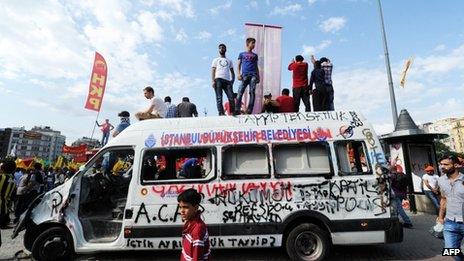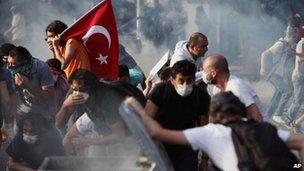Disaffected Turks vow to remain on streets of Istanbul
- Published
Almost 1,000 people were detained in more than 90 protests held across the country
As Turkey experiences the most widespread protests for years, the BBC's James Reynolds assesses the mood on the streets of Istanbul.
Late at night, in a wealthy neighbourhood of Istanbul, women lean out of their apartment windows to clang their pots and pans as loudly as they can.
They wave Turkish flags and show their support for the demonstrators who've taken on the police, and taken over Taksim Square and Gezi Park. The clangs are joined by the beep of car horns. The noise echoes across the rooftops.
A few blocks away, demonstrators wander past the wreckage of trucks and cars. Several roads are blocked by makeshift barricades. Some protesters pose in front of a burnt-out police van.
They even take turns to sit in the driver's seat and pretend to change gears. One man raises a glass of beer in defiance of the government's new restrictions on the sale of alcohol.
"I'm here because of [Prime Minister] Erdogan - we are against him," says Yasemin Cakici, a teacher.
"He's a dictator. Whenever we want to say our beliefs he always says: 'No you can't speak. You are lying and you are very little.'"

There was a festival atmosphere in Taksim Square on Sunday
Demonstrators fear that, bit by bit, Mr Erdogan is trying to turn Turkey into an authoritarian, religious state. They worry that their freedoms, and their public spaces, are under attack.
But the prime minister insists that he is a democrat, with a solid mandate from a public which has elected him to office three times in fair elections. He calls the protesters undemocratic. They say exactly the same thing about him.
'They don't listen'
In Taksim Square, rows of students sit along the pavement. Some hold flags, others take in the sun.
"I have some problems with my education," says Ersin Gultekin, an 18-year-old secondary school student.
He speaks quietly: "In the exams there are lot of fake points for the supporters of the government. If you support this government, you can pass the exam."

Hundreds of people are reported to have been injured in clashes
But several passers-by do not share the crowd's views.
"I'm very upset by what I see," says Omar Sarikaya, a screenwriter. "This has nothing to do with peace. They don't listen to the government."
Even some protestors believe that the sight of burnt-out cars will not help their cause. Others have no doubts whatsoever.
"I've been here almost 13 hours, I haven't slept yet, I haven't gone home yet," says an architect who identifies herself only as Gamze.
"I've been supporting my friends, my people, and whoever thinks the way that I'm thinking. We're going to go work and we're going to come back. I don't care, I don't go home, I sleep on the ground, I sleep on the grass. I don't care. We're going to keep doing this till he [Erdogan] resigns."
The protesters insist that they have to carry on. They want their voices to be heard. But, at this point, they also face an important question: can they turn their anger into a lasting political movement?
- Published3 June 2013
- Published3 June 2013
- Published1 June 2013
- Published24 October 2012
- Published24 May 2013
- Published30 September 2012